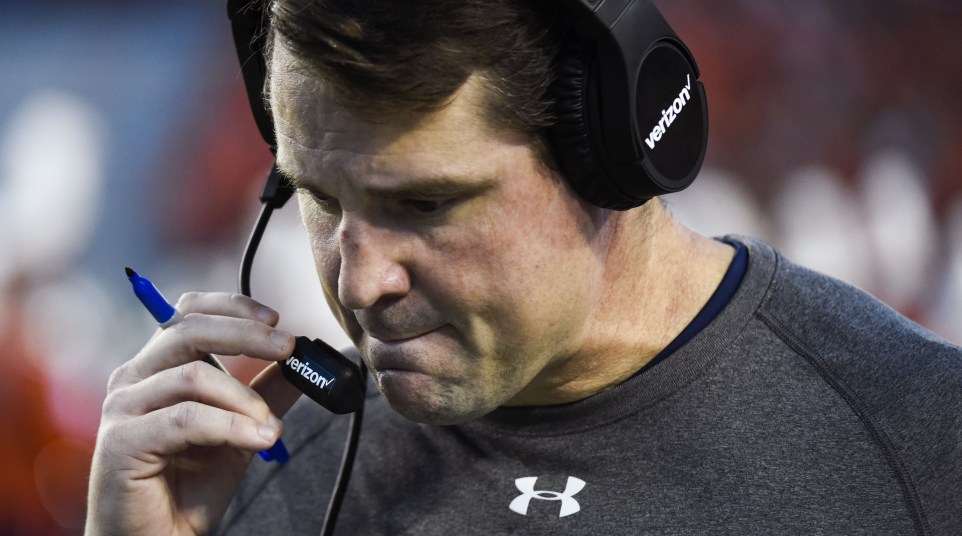
How every new SEC coordinator fared in 2015
There were a large number of offensive and defensive coordinators working in new roles during this 2015 season in the SEC. Let’s take a brief look at how that first year on the job went for each of them.
Arkansas OC Dan Enos: The former Central Michigan head coach fit right in Fayetteville, and the production from his offense during the second half of the season in particular made his first year as offensive coordinator an unquestioned success. The Razorbacks finished second in the league in scoring offense (35.2) and total offense (456.8 yards). Enos also got the most out of senior QB Brandon Allen, who really flourished in his final season on campus.
Auburn DC Will Muschamp: There were tremendously high expectations for “Coach Boom” in his return to The Plains as a defensive coordinator. So given that the Tigers ranked 13th in the league in total defense, it would be hard to term his first year as a success. That being said, it was a massive rebuilding job and he didn’t exactly get a ton of help from his offense.
Florida OC Doug Nussmeier: This one is tough to grade. The numbers rate this offense as better than only Vanderbilt and Missouri in terms of yardage, but Nussmeier actually did a pretty good job for a team that was offensively challenged prior to his arrival. The Gators were 6-0 and the offense was clicking with freshman QB Will Grier prior to his suspension, and it is clear Nussmeier has been limited in recent weeks by the lack of solid play from QB Treon Harris.
Florida DC Geoff Collins: Knowing he was working from a position of strength with an outstanding group and scheme already assembled by former coach Will Muschamp, Collins deserves credit for identifying and building upon that chemistry this season. The Gators defense was fantastic, ranking behind only Alabama at the top of the league in total defense.
Georgia OC Brian Schottenheimer: His first, and perhaps only, season as the Bulldogs play-caller left a lot of be desired. He was not able to get much out of his trio of quarterbacks, settling for the game management skills of Greyson Lambert, and ranked ninth in the league in total offense in spite of access to one of the league’s best offensive lines and possibly the most talented group of running backs in the country.
Kentucky OC Shannon Dawson: Things were up and down during his first season. The Wildcats offense appeared overmatched against some of the division’s top defensive units, scoring just nine points against Florida and three against Georgia. But the Wildcats did average a healthy 39 points per game against nonconference opponents.
LSU DC Kevin Steele: Replacing a legend is never easy, but Steele did a decent job as the defensive coordinator in place of John Chavis. The Tigers slipped all the way to 10th in the league with 24.0 points allowed per game, but were still relatively stingy, allowing just 342.5 yards per game (5th in SEC). The secondary struggled against the pass at times.
Mississippi State DC Manny Diaz: The Bulldogs didn’t rank near the top of the league in any of the major defensive categories, but Diaz did an admirable job with a defense that replaced several starters and had key injuries throughout the season. Things did come off the tracks a bit down the stretch, as the Bulldogs allowed 119 points during the final three games of the season.
Missouri DC Barry Odom: This was a successful hire for Gary Pinkel. The Missouri defense ranked third in the league in points allowed and fourth in yards allowed. Unfortunately, the Tigers offense did very little to help their new defensive coordinator.
South Carolina co-DC Jon Hoke: Hoke was unable to revive a struggling Gamecocks defense in his reunion with Steve Spurrier. The Gamecocks gave up a league-worst 429.8 yards per game during a tumultuous 3-9 season.
Tennessee OC Mike DeBord: There was some concern among Tennessee fans about this hire prior to the season, but things have worked out just fine so far. DeBord has made good use of talented RBs Jalen Hurd and Alvin Kamara, and has highlighted strengths of QB Joshua Dobbs. Getting a downfield passing game going between now the 2016 opener will be a top priority.
Texas A&M DC John Chavis: The Chief has a reputation as the league’s elite defensive coordinator for his work done during previous stops at Tennessee and LSU, and the improvements to a porous Aggies defense during his first season back up that status. Texas A&M ranked sixth in the league in scoring defense and seventh in yards allowed after being near the bottom in 2014.
Vanderbilt OC Andy Ludwig: Things weren’t pretty during Ludwig’s first season with the Commodores, as his offense ranked 124th out of 128 FBS teams with just 15.2 points per game. Quarterback play was his Achilles heel. The former Wisconsin offensive coordinator did not have Melvin Gordon in the backfield, but RB Ralph Webb did have one of the better rushing seasons in school history.
Vanderbilt HC Derek Mason: Mason himself was not new this season, but the Commodores head coach did name himself the team’s defensive coordinator after firing David Kotulski following the 2014 season. The results were quite impressive, as the former Stanford defensive coordinator transformed the Commodores defense into one of the better units in the SEC seemingly overnight.
